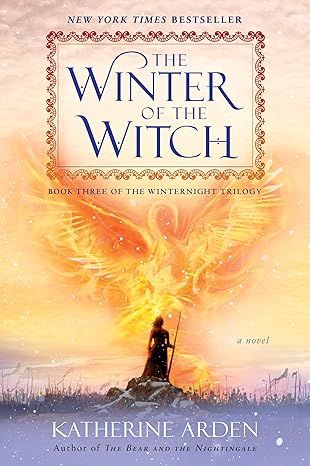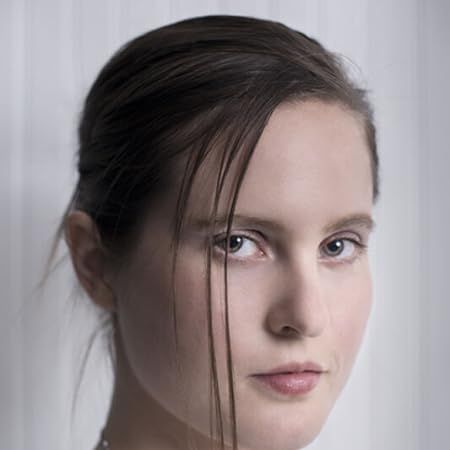The Winter of The WitchKindle
4.7
-
8,459 ratings
NEW YORK TIMES BESTSELLER • Following their adventures in The Bear and the Nightingale and The Girl in the Tower, Vasya and Morozko return in this stunning conclusion to the bestselling Winternight Trilogy, battling enemies mortal and magical to save both Russias, the seen and the unseen.
“A tale both intimate and epic, featuring a heroine whose harrowing and wondrous journey culminates in an emotionally resonant finale.”—Publishers Weekly (starred review)
NAMED ONE OF PASTE’S BEST FANTASY BOOKS OF THE DECADE
Vasilisa Petrovna is an unforgettable heroine determined to forge her own path. Her gifts and her courage have drawn the attention of Morozko, the winter-king, but it is too soon to know if this connection will prove a blessing or a curse.
Now Moscow has been struck by disaster. Its people are searching for answers—and for someone to blame. Vasya finds herself alone, beset on all sides. The Grand Prince is in a rage, choosing allies that will lead him on a path to war and ruin. A wicked demon returns, determined to spread chaos. Caught at the center of the conflict is Vasya, who finds the fate of two worlds resting on her shoulders. Her destiny uncertain, Vasya will uncover surprising truths about herself as she desperately tries to save Russia, Morozko, and the magical world she treasures. But she may not be able to save them all.
Praise for The Winter of the Witch
“Katherine Arden’s Winternight Trilogy isn’t just good—it’s hug-to-your-chest, straight-to-the-favorites-shelf, reread-immediately good, and each book just gets better. The Winter of the Witch plunges us back to fourteenth-century Moscow, where old gods and new vie for the soul of Russia and fate rests on a witch girl’s slender shoulders. Prepare to have your heart ripped out, loaned back to you full of snow and magic, and ripped out some more.”—Laini Taylor
“Luxuriously detailed yet briskly suspenseful . . . a striking literary fantasy informed by Arden’s deep knowledge.”—Kirkus Reviews (starred review)
Read more
Kindle
$13.99
Available instantly
Audiobook
$0.00
with membership trial
Hardcover
$15.49
Paperback
$12.95
Ships from
Amazon.com
Payment
Secure transaction
ISBN-10
1785039733
ISBN-13
978-1785039737
Print length
372 pages
Language
English
Publisher
RANDOM HOUSE UK
Publication date
September 30, 2019
Dimensions
5 x 0.87 x 7.76 inches
Item weight
2.31 pounds
Frequently bought together
Popular Highlights in this book
If you spend all your days bearing the burden of unforgotten wrongs you will only wound yourself.
Highlighted by 594 Kindle readers
Magic makes men mad. They forget what is real because too much is possible.
Highlighted by 541 Kindle readers
Product details
ASIN :
B077LT812J
File size :
9073 KB
Text-to-speech :
Enabled
Screen reader :
Supported
Enhanced typesetting :
Enabled
X-Ray :
Enabled
Word wise :
Enabled
Editorial Reviews
“[Katherine] Arden’s gorgeous prose entwines political intrigue and feminist themes with magic and folklore to tell a tale both intimate and epic, featuring a heroine whose harrowing and wondrous journey culminates in an emotionally resonant finale.”—Publishers Weekly (starred review)
“Katherine Arden’s Winternight Trilogy isn’t just good—it’s hug-to-your-chest, straight-to-the-favorites-shelf, reread-immediately good, and each book just gets better. The Winter of the Witch plunges us back to fourteenth-century Moscow, where old gods and new vie for the soul of Russia and fate rests on a witch girl’s slender shoulders. Prepare to have your heart ripped out, loaned back to you full of snow and magic, and ripped out some more.”—Laini Taylor
“Luxuriously detailed yet briskly suspenseful . . . a striking literary fantasy informed by Arden’s deep knowledge.”—Kirkus Reviews (starred review)
“Visceral descriptions of battle, an atmospheric sense of place, and some truly heartbreaking moments of loss make this a gut-wrenching read, but there’s ample hope and satisfaction to be found as Vasya chooses her own unique path to triumph.”—Booklist
“Exciting, moving, and beautifully written, this is a story readers will savor.”—Library Reads
Sample
1
Marya Morevna
Dusk at the end of winter, and two men crossed the dooryard of a palace scarred by fire. The dooryard was a snowless waste of water and trampled earth; the men sank to their ankles in the muck. But they were speaking intently, heads close together, and did not heed the wet. Behind them lay a palace full of broken furniture, smoke-stained; the screen-work smashed on the staircases. Before them lay a charred ruin that had been a stable.
“Chelubey disappeared in the confusion,” said the first man bitterly. “We were busy saving our own skins.” A smear of soot blackened his cheek, blood crusted in his beard. Weary hollows, like blue thumbprints, marred the flesh beneath his gray eyes. He was barrel-chested, young, with the fey energy of a man who has driven himself past exhaustion to a surreal and persistent wakefulness. Every eye in the dooryard followed him. He was the Grand Prince of Moscow.
“Our skins, and a little more,” said the other man—a monk—with a touch of grim humor. For, against all hope, the city was mostly intact, and still theirs. The night before, the Grand Prince had come close to being deposed and murdered, though few people knew that. His city had nearly burned to ash; only a miraculous snowstorm had saved them. Everyone knew that. A swath of black gashed the heart of the city, as though the hand of God had fallen in the night, dripping fire from its nails.
“It was not enough,” said the Grand Prince. “We may have saved ourselves, but we made no answer for the treachery.” All that bitter day, the prince had reassuring words for every man who caught his eye, had calm orders for the men wrangling his surviving horses and hauling away the charred beams of the stable. But the monk, who knew him well, could see the exhaustion and the rage just beneath the surface. “I am going out myself, tomorrow, with all that can be spared,” the prince said. “We will find the Tatars and we will kill them.”
“Leave Moscow now, Dmitrii Ivanovich?” asked the monk, with a touch of disquiet.
A night and a day without sleep had done nothing for Dmitrii’s temper. “Are you going to tell me otherwise, Brother Aleksandr?” he asked, in a voice that made his attendants flinch.
“The city cannot do without you,” said the monk. “There are dead to mourn; there are granaries lost, and animals and warehouses. Children cannot eat vengeance, Dmitrii Ivanovich.” The monk had no more slept than the Grand Prince; he could not quite mask the edge in his own voice. His left arm was wrapped in linen where an arrow had gone into the muscle below the shoulder, and been dragged through and out again.
“The Tatars attacked me in my own palace, after I had made them welcome in good faith,” retorted Dmitrii, not troubling to keep the rage from his reply. “They conspired with a usurper, they fired my city. Is all that to go unavenged, Brother?”
The Tatars had not, in fact, fired the city. But Brother Aleksandr did not say so. Let that—mistake—be forgotten; it could not be mended now.
Coldly, the Grand Prince added, “Did not your own sister give birth to a dead child in the chaos? A royal infant dead, a swath of the city in ashes—the people will cry out if there is not justice.”
“No amount of spilled blood will bring back my sister’s child,” said Sasha, sharper than he meant. Clear in his mind was his sister’s tearless mourning, worse than any weeping.
Dmitrii’s hand was on the hilt of his sword. “Will you lecture me now, priest?”
Sasha heard the breach between them, scabbed over but unhealed, in the prince’s voice. “I will not,” said Sasha.
Dmitrii, with effort, let go the twining serpents of his sword-hilt.
“How do you mean to find Chelubey’s Tatars?” Sasha asked, trying for reason. “We have pursued them once already, and rode a fortnight without a glimpse, though that was in deepest winter, when the snow took good tracks.”
“But we found them, then,” said Dmitrii, and his gray eyes narrowed. “Did your younger sister survive the night?”
“Yes,” said Sasha warily. “Burns on her face, and a broken rib, Olga says. But she is alive.”
Now Dmitrii looked troubled. Behind him, one of the men clearing away the wreckage dropped the end of a broken roof-beam, swearing. “I would not have come to you in time, if it weren’t for her,” Sasha said to his cousin’s grim profile. “Her blood saved your throne.”
“The blood of many men saved my throne,” snapped Dmitrii without looking round. “She is a liar, and she made a liar of you, the most upright of men.”
Sasha said nothing.
“Ask her,” said Dmitrii, turning. “Ask her how she did it—found the Tatars. It can’t be only sharp eyes; I have dozens of sharp-eyed men. Ask her how she did it, and I will have her rewarded. I do not think any man in Moscow would marry her, but a country boyar might be persuaded. Or enough gold would bribe a convent to take her.” Dmitrii was talking faster and faster, his face uneasy, the words spilling out. “Or she may be sent home in safety—or stay in the terem with her sister. I will see she has enough gold to keep her comfortable. Ask her how she did it, and I will make all straight for her.”
Sasha stared, full of words he could not say. Yesterday she saved your life, slew a wicked magician, set fire to Moscow and then saved it all in a single night. Do you think she will consent to disappear, for the price of a dowry—for any price? Do you know my sister?
But of course, Dmitrii did not. He only knew Vasilii Petrovich, the boy she had pretended to be. They are one and the same. Beneath his bluster Dmitrii must realize that; his unease betrayed him.
A cry from the men around the stable spared Sasha from answering. Dmitrii turned with relief. “Here,” he said, striding over. Sasha trailed, grim-faced, in his wake. A crowd was gathering where two burned roof-beams crossed. “Stand aside—Mother of God, are you sheep at the spring grass? What is it?” The crowd shrank away from the steel in his voice. “Well?” said Dmitrii.
One of the men found his tongue. “There, Gosudar,” he said. He pointed at a gap between two fallen posts, and someone thrust down a torch. An echoing gleam came from below where a shining thing gave back the torchlight. The Grand Prince and his cousin stared, dazzled, doubting.
“Gold?” said Dmitrii. “There?”
“Surely not,” said Sasha. “It would have melted.”
Three men were already hauling aside the timbers that pinned the thing to the earth. A fourth plucked it out and handed it to the Grand Prince.
Gold it was: fine gold, and not melted. It had been forged into heavy links and stiff bars, oddly jointed. The metal had an oily sheen; it threw a shimmer of white and scarlet onto the ring of peering faces and made Sasha uneasy.
Dmitrii held it this way and that, then said, “Ah,” and switched his grip so that he held it by the crownpiece, reins over his wrist. The thing was a bridle. “I have seen this before,” said Dmitrii, eyes alight. An armful of gold was very welcome to a prince whose coffers had been shrunk by bandits and by fire.
“Kasyan Lutovich had it on his mare yesterday,” said Sasha, disliking the reminder of the day before. His eye dwelled with disfavor on the spiked bit. “I would not have blamed her for throwing him.”
“Well, this thing is a forfeit of war,” said Dmitrii. “If only that fine mare herself had not vanished—damn those Tatars for horse-thieves. A hot meal and wine for all you men; well done.” The men cheered raggedly. Dmitrii handed off the bridle to his steward. “Clean it,” the Grand Prince said. “Show it to my wife. It might cheer her. Then see it safely locked away.”
“Is it not strange,” Sasha said warily when the reverent steward had departed, the golden thing in his arms, “that this bridle should have lain in the stable as it burned and yet show no hurt?”
“No,” said Dmitrii, giving his cousin a hard look. “Not odd. Miraculous, coming on the heels of that other miracle: the snowstorm that delivered us. You are to tell anyone who asks exactly that. God spared this golden thing, because he knew our need was great.” The difference between uncanny happenings of the benevolent and the wicked sort was no thicker than rumor, and Dmitrii knew it. “Gold is gold. Now, Brother—” But he fell silent. Sasha had stilled, his head lifted.
“What is that noise?”
A confused murmuring was rising from the city outside: a roar and snap, like water on a rocky shore. Dmitrii frowned. “It sounds like—”
A shout from the gate-guard cut him off.
A little way down the hill of the kremlin, the dusk came earlier, and the shadows fell cold and thick over another palace, smaller and quieter. The fire had not touched it, except for singeing from falling sparks.
All Moscow roiled with rumors, with sobs, curses, arguments, questions, and yet here a fragile order reigned. The lamps were lit; servants gathered what could be spared for the comfort of the impoverished. The horses drowsed in their stable; tidy columns of smoke rose from the chimneys of bakehouse and cookhouse, brewhouse, and the palace itself.
The author of this order was a single woman. She sat in her workroom, upright, impeccable, starkly pale. Sweeping lines of strain framed her mouth, though she was not yet thirty. The dark streaks beneath her eyes rivaled Dmitrii’s. She had gone into the bathhouse the night before and delivered her third child, dead. In that same hour, her firstborn had been stolen, and nearly lost in the horrors of the night.
But despite all that, Olga Vladimirova would not rest. There was too much to be done. A steady stream of people came to her, where she sat by the workroom oven: steward and cook, carpenter, baker, and washerwoman. Each one was dispatched with an assignment and some words of thanks.
A pause came between petitioners, and Olga slumped back in her chair, arms wrapped around her belly, where her unborn child had been. She had dismissed her other women hours ago; they were higher in the terem, sleeping off the shocks of the night. But one person would not go.
“You ought to go to bed, Olya. The household can manage without you until morning.” The speaker was a girl, sitting stiff and watchful on a bench beside the oven. She and the proud Princess of Serpukhov both had long black hair, the plaits wrist-thick, and an elusive similarity of feature. But the princess was delicate, where the girl was tall and long-fingered, her wide eyes arresting in the rough-hewn angles of her face.
“You should indeed,” said another woman, backing into the room bearing bread and cabbage stew. It was Lent; they could not eat fat meat. This woman looked as weary as the other two. Her plait was yellow, just touched with silver, and her eyes were wide and light and clever. “The house is safe for the night. Eat this, both of you.” She began briskly ladling out soup. “And then go to bed.”
Olga said, slow with exhaustion, “This house is safe. But what of the city? Do you think Dmitrii Ivanovich or his poor fool of a wife are sending servants out with bread to feed the children that this night has orphaned?”
The girl sitting on the oven-bench paled, and her teeth sank into her lower lip. She said, “I am sure Dmitrii Ivanovich is making clever plans to take vengeance on the Tatars, and the impoverished will just have to wait. But that does not mean—”
A shriek from above cut her off, and then the sound of hurrying footsteps. All three women glared at the door with identical expressions. What now?
The nurse burst into the room, quivering. Two waiting-women panted in her wake. “Masha,” the nurse gasped. “Masha—she is missing.”
Olga was instantly on her feet. Masha—Marya—was her only daughter, the one who had been stolen from her bed just the night before. “Call in the men,” Olga snapped.
But the younger girl tilted her head, as though she were listening. “No,” said the girl. Every head in the room whipped round. The waiting-women and the nurse exchanged dark glances. “She’s gone outside.”
“Then that—” Olga began, but the other interrupted, “I know where she is. Let me go and get her.”
Olga gave the younger girl a long look, which she returned steadily. The day before, Olga would have said that she’d never trust her mad sister with one of her children.
“Where?” Olga asked.
“The stable.”
“Very well,” said Olga. “But, Vasya, bring Masha back before the lamps are lit. And if she is not there, tell me at once.”
The girl nodded, looking rueful, and got to her feet. Only when she moved could one see that she was favoring one side. She had a broken rib.
Read more
About the authors
Katherine Arden
Born in Austin, Texas, Katherine Arden spent her junior year of high school in Rennes, France.
Following her acceptance to Middlebury College in Vermont, she deferred enrolment for a year in order to live and study in Moscow. At Middlebury, she specialized in French and Russian literature.
After receiving her BA, she moved to Maui, Hawaii, working every kind of odd job imaginable, from grant writing and making crêpes to serving as a personal tour guide. After a year on the island, she moved to Briançon, France, and spent nine months teaching. She then returned to Maui, stayed for nearly a year, then left again to wander. Currently she lives in Vermont, but really, you never know.
She is the author of The Bear and the Nightingale.
Read more
Reviews
Customer reviews
4.7 out of 5
8,459 global ratings
Pamela T
5
Excellent Book…. Amazing series
Reviewed in the United States on January 22, 2019
Verified Purchase
The Winternight Trilogy is about folklore and historical figures set in Medieval Russia, good vs evil and magic vs christianity– on first glance I thought b-o-r-i-n-g – but boy was I wrong! In my opinion, this is an excellent book – full stop!
The world building is amazing, the characters are well written - they grow and develop throughout the series. (No card board characters in this story.) The heroine Vasya is strong, fierce and brave but has a lot to learn and it was exciting to see her figureout who is she and what she is destined to become. Warning: Vasya goes through many “tests” of her power (often violent) that are described in detail so if you are a little squeamish you may want to avoid this series. The reader will be enchanted and cheering Vasya along on her journey. The author will have you guessing who is good and who is evil. Honestly, all the characters were so well written I felt like I knew them and their motivation. I loved the good characters and even felt pity for the evil characters.
If had to summarize the Winternight Trilogy - The Bear and the Nightingale bewitches you with the strong characters and their stories, the Girl in the Tower has you wondering what the heck is going to happen next (with a few surprises) and in The Winter of the Witch there is non-stop action which wraps up the story with a satisfying ending.
I laughed, I cried, I shouted, I was surprised, I was touched by magic and loved every minute of it! I highly recommend.
Note: The Winter of the Witch is the third book in the Winternight Trilogy by Katherine Arden. The Bear and the Nightingale is Book 1 and the Girl in the Tower is Book 2. I strongly suggest that you read the first two books before starting The Winter of the Witch – since the story jumps right into the action from the first page and it might be disorienting if you have not read the first two books.
Read more
Tigerlily64
5
Historical Fiction, Fantasy, Third Book of the Winterlight Trilogy
Reviewed in the United States on March 16, 2019
Verified Purchase
This is the third book of the fascinating Winterlight trilogy. Please note that it is important to read the other two books of the series before reading this one.
If you remember the end of book 2, “The Girl in the Tower”, Vasya and Sasha are able to escape their imprisonment in order to help the Grand Prince of Moscow fight off the usurpers. Vasya , with the help of the ghost of her grandmother Tamara, rescues her niece Marya from the clutches of Kasyan, the sorcerer. However, when Vasya retrieves Solovey from the Prince of Moscow’s stables, she sees Kasyan’s golden mare there. The mare is the first horse she has ever feared, and, in anger, she rips the golden bridle from the mare.. Astonishing her, the mare turns into a firebird and flames leap up and spread throughout the city. The Frost Demon answers Vasya’s plea for aide and stirs up a snowstorm to put out the flames. Yet the snow comes too late to prevent some homes from burning, and some lives are lost, as well.
In “The Winter of the Witch”, book 3 of the trilogy, the handsome priest, Father Konstantine, feeling Vasya’s rejection of his advances, stirs the people up against her. He has abandoned his search for God yet espouses an unsullied Christian faith. Hoping to have power over the people, he makes a pact with the Devil. The people adore him and follow him blindly. He accuses Vasya of setting Moscow on fire. With the help of the angry mob, the priest seizes her and puts her in an enclosed cage placed on kindling set to burn.
Using her newly realized power of invisibility, Vasya escapes the cage and is taken out of the area with the help of the Midnight Demon. She travels with great speed through Midnight (where it is always midnight) and learns more about the history of her grandmother, Tamara, who passed her gift of second sight to Vasya.
Vasya goes on to help fight the Tatur invaders who want to rule all of Russia. She shows great courage and daring as a female warrior.
Love grows between Vasya and Morozoko, the Frost Demon, but Vasya also asserts her independence.
She helps Morozoko chain his brother, The Bear, who fosters bedlam, violence, and madness. Vasya seeks out The Bear sometime later to help in the war against the Taturs. She makes him swear allegiance to her and threatens to chain him up with the magic golden bridle if he misbehaves.
Vasya becomes a power in her own right, apart from The Bear or the Frost Demon. She will inherit a kingdom and is really a princess warrior.
This is a very exciting series. This last book is even more like a fairytale than the first two and the reader has to suspend belief more often. However, the story is compelling and pulled me in irresistibly.
The story of Vasya is based on the Russian fairytale, “Vasya the Beautiful”. The author has done considerable research and writes with a lyrical beauty.
This is a great series for young adults as well as older adults. A female heroine like Vasya is a good role model for women. She isn’t perfect, and sometimes she isn’t as kind as she was early on in the series, but she is fascinating and likable.
I got this book through Audible and have bought the hardback, since I like this series so much.
Read more
2 people found this helpful
Cathie Frey
5
Love this book
Reviewed in the United States on April 20, 2024
Verified Purchase
Loved this book and the whole series. I hope she writes some more books like this.
Josh Mauthe
5
A wonderful ending that unifies the story's threads into something more than the sum of their parts
Reviewed in the United States on February 4, 2019
Verified Purchase
It's hard to think of a recent release that I've been as excited for as The Winter of the Witch, the final entry in Katherine Arden's beautiful, magical Winternight trilogy. From the first few pages of her incredible debut novel, The Bear and the Nightingale, I was hooked; by the time I turned the last pages of The Girl in the Tower, I was almost angry that I had to wait for the third book. But as any fan knows, those same expectations can work against a book, especially when it's the final part of a series; sometimes, you get so excited that no ending can ever live up to your hopes.
Luckily, that's not the case with The Winter of the Witch, which wraps up Arden's sprawling saga in a way that draws everything into focus, revealing that all this time, she's been telling two stories simultaneously: one about a young girl who straddles the line between humanity and magical creatures, and one about the formation of Russia itself during the medieval period. And if Winter feels just a tiny bit overstuffed, well, the book's ambition and successful fulfillment of those goals more than justifies it.
At its core, The Winter of the Witch has three things to accomplish, leading the book to feel like it's three stories that all interweave together:
Arden has to wrap up the lingering threads left hanging at the end of The Girl in the Tower, where cataclysmic events ran all the way to the end of the novel, leaving the aftermath to be explored. We need to watch as Vasilisa comes to terms with her destiny, finding a way to unify Russia's pagan folklore with the rapidly approaching wave of Christianity that's washing across the nation. And finally, we need to deal with the imminent threat of the Khans as they work to destroy the loose federation of Russian tribes that are unifying in opposition. That's a lot to take on, and at times, Winter of the Witch feels like it breaks a bit into three separate stories that don't always connect into each other. Arden fixes that by the end, giving us a stunning climax that weaves together every disparate piece of the series into one astonishing sequence that clarifies the series' focus in a way that genuinely both shocked me and completely unifies the books into a continuous saga.
But even before that ending, Arden makes each of these segments work beautifully on their own merits. The novel's opening is harrowing, bringing a nightmarish intensity and horror to the book that brings home the impact of the characters' choices to this point. More than that, though, it gives the final book of the series stakes in a way that I didn't expect, reminding us of how many forces Arden has working in opposition to Vasilisa, and just how dangerous these ideas truly are.
And then, just when we're at the bottom point of the book, Arden twists reality around us all over again, immersing us in a magical world that we've never seen before, and plunging even more deeply into Russian folklore and mythology, and slowly revealing more and more of the backstory of Vasya's family that have, to this point, only been hinted at. It's all satisfying and engaging, but more than that, it gives Arden the chance to breathe and live in her wondrous world, conveying the unreality of her planes through her carefully written prose - and that's before she springs some major, major surprises on us.
It's hard to talk much about the end of The Winter of the Witch without giving away some of what Arden has planned (although I would point out that anyone who has knowledge of Russian history, or who glances too much into the helpful glossary at the end of the book, might find the story spoiled by historical facts). That's not just in terms of the rich storytelling she's got going, which finds the lines between villains and heroes blurring, questions of faith raised, and familial relationships complicating around them. No, The Winter of the Witch also delivers on an emotional level, bringing us closure not just in on the big picture and in our story, but on the level of relationships - most importantly, the relationship between Vasya and Morozko, the incarnation of Frost and Death.
The Winter of the Witch, in other words, does everything you want a finale of a series to do. It provides us closure on all of its plot threads and disparate stories. It concludes all of our characters' arcs, allowing them to develop and grow, and giving us an end to their story that's satisfying while not being excessively wrapped up. It clarifies and coheres the series' thematic complexities, unifying its questions of faith, folklore, historical movement, national pride, and destiny into one powerful message and idea. It rewards us for our emotional investment in these characters, making us both hurt and rejoice with them as they reach their ends. And in the end, it leaves us wanting more time in this world, even as it gives us an ending. Does it have a lot to do? Yes. Does it feel like it could use maybe a bit more time? Sure...but it's also magical, beautiful, and moving, and lives up to my hopes for the other books in the series - and given how much I loved them, that's a big deal indeed.
Read more
11 people found this helpful
B&N Smith
5
One of my all time favorite trilogies
Reviewed in the United States on February 5, 2024
Verified Purchase
Absolutely love this trilogy! Arden’s unique writing style is poetic and descriptive at the same time. Love the plot. Beautiful characters. Amazing setting. It’s just brilliant.
Top Katherine Arden titles
View all
Empty Smiles (Small Spaces Quartet)
4.5
-
514
$8.81

Dark Waters (Small Spaces Quartet)
4.5
-
702
$2.99

Dead Voices (Small Spaces Quartet)
4.6
-
1,279
$2.99

Small Spaces (Small Spaces Quartet)
4.6
-
2,480
$4.99
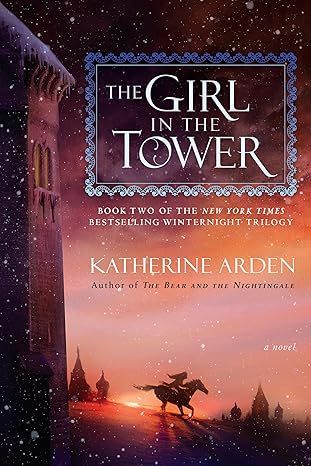
The Girl in the Tower: A Novel (Winternight Trilogy)
4.6
-
9,947
$12.99
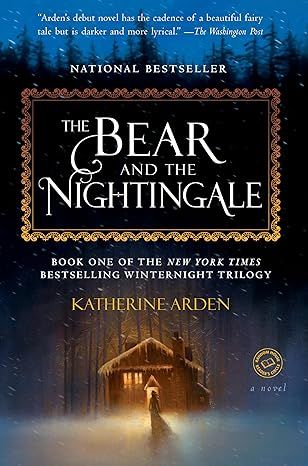
The Bear and the Nightingale: A Novel (Winternight Trilogy)
4.4
-
16,897
$10.39
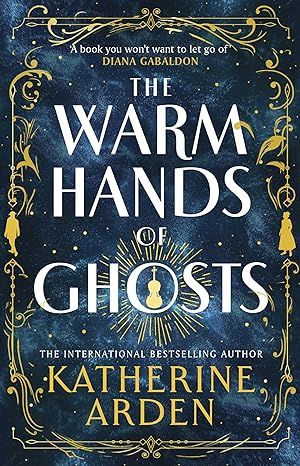
The Warm Hands of Ghosts
4.3
-
1,167
$13.99
Best Sellers
View all
The Tuscan Child
4.2
-
100,022
$8.39

The Thursday Murder Club: A Novel (A Thursday Murder Club Mystery)
4.3
-
155,575
$6.33

Sapiens: A Brief History of Humankind
4.6
-
140,302
$13.49

The Butterfly Garden (The Collector, 1)
4.3
-
88,556
$9.59

Things We Hide from the Light (Knockemout Series, 2)
4.4
-
94,890
$11.66

The Last Thing He Told Me: A Novel
4.3
-
154,085
$2.99

The Perfect Marriage: A Completely Gripping Psychological Suspense
4.3
-
143,196
$9.47

The Coworker
4.1
-
80,003
$13.48

First Lie Wins: A Novel (Random House Large Print)
4.3
-
54,062
$14.99

Mile High (Windy City Series Book 1)
4.4
-
59,745
$16.19

Layla
4.2
-
107,613
$8.99

The Locked Door
4.4
-
94,673
$8.53
